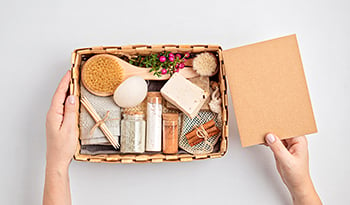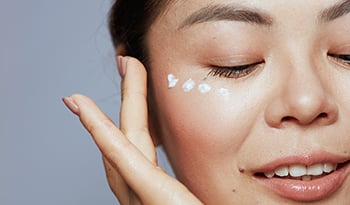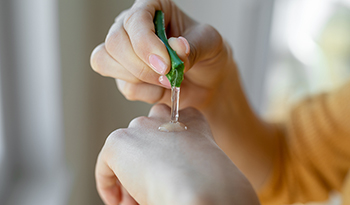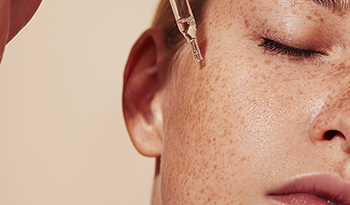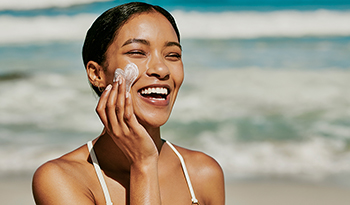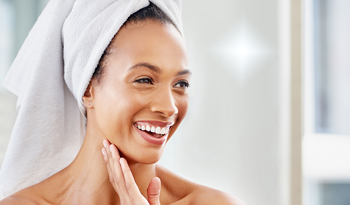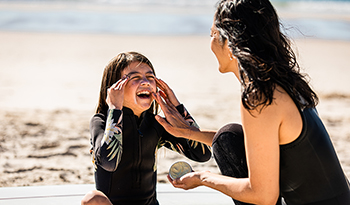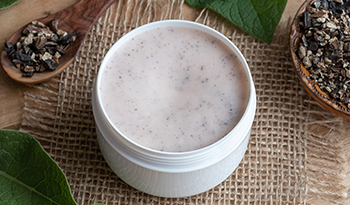6 Tips for Preventing Maskne
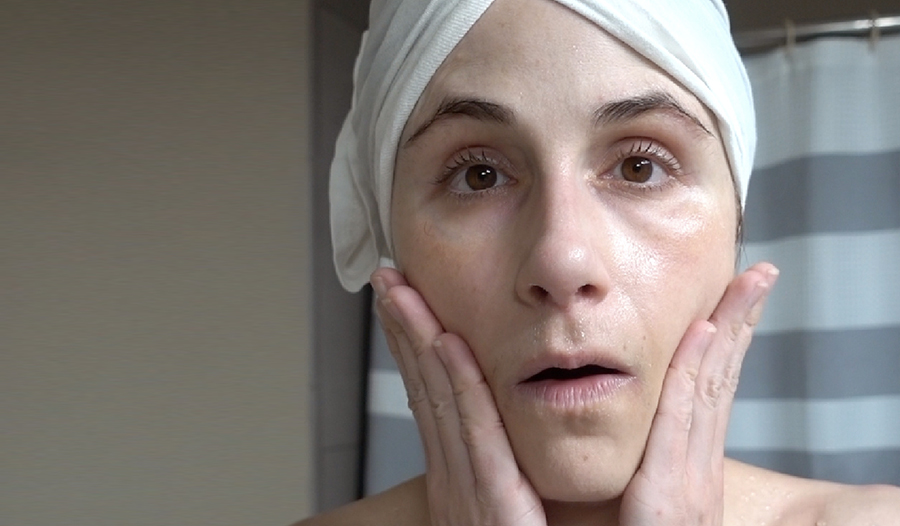
As the pandemic continues, wearing a face mask has become part of our everyday lives. However, masks can be really rough on your skin and lead to breakouts. “Maskne” (mask + acne) refers to acne breakouts on the lower face due to wearing a mask.
If you have a history of acne you may be more at risk, however, even those with no history of skin issues can wind up with maskne. Because masks are essential, there are some simple modifications you can make to your skin care routine that will help prevent maskne and skin problems due to wearing a mask.
Below is an explanation on what causes maskne, and 6 simple and easy-to-implement tips for preventing it.
What Causes Maskne?
To prevent maskne, it helps to first understand the three main reasons masks cause breakouts and skin problems. Once you understand the causes of maskne, adjusting your routine and habits to prevent maskne will be a no-brainer.
Friction
Masks cause irritation by rubbing the skin, similar to chafing. Areas of the face that are the most susceptible to this are behind the ears, where the elastic bands hit, as well as the bridge of the nose, cheeks, and jawline. A mask that fits poorly is especially problematic. A mask that is too loose will wind up sliding back and forth on the skin. A mask that is too tight can put pressure on the skin, causing it to break down over time. Rough fabrics or bunchy seams create additional friction on the skin.
Irritation
Depending on the mask material, certain fabrics can absorb the skin’s natural oils. This can dry out the skin and cause sensitivity. Laundry detergents and fabric softeners, used to clean your mask, can leave behind a residue that is irritating to the skin. Sweating underneath your mask also can cause a lot of irritation to the skin barrier. Some of that sweat will also be absorbed by the mask, which can facilitate bacterial growth, leading to breakouts. Makeup residue is another culprit irritant that can clog pores and aggravate your skin. If you have a tendency to drool or spit when you talk, saliva can get trapped on your skin under the mask and can majorly impact the integrity of your skin barrier. This irritation also makes you vulnerable to other skin issues and even skin infections.
Occlusion
Masks occlude the skin leading to clogged pores, pimples, and even acne cysts. The trapping of your breath and sweat under the mask leaves the skin moist and warm. Dirt, oil, and makeup underneath your mask is especially irritating to your pores and can trigger acne breakouts. This combination of heat and moisture not only aggravates acne, but also leads to skin breakdown and irritation.
How Can I Prevent Maskne?
Knowing the causes of maskne is half the battle! Now that you are practically an expert on the ins and outs of maskne, here are 6 tips to prevent maskne:
Tip #1: Start with a clean face
Remember the point about occlusion and maskne? The last thing you want to do is to occlude dirt and oil on your skin. Always put your mask on a clean face to prevent breakouts. You will want to go with a gentle cleanser that is fragrance free and dye free. Fragrance and dyes are commonly irritating, so ditch that pina colada-scented bright pink cleanser!
I recommend the CeraVe Hydrating Facial Cleanser for Normal to Dry Skin. It is formulated with ceramides and hyaluronic acid and is super gentle on the skin. The MVE delivery technology supports moisture balance, and it is accepted by the National Eczema Association, so you know that means it is a win for the skin. Neutrogena Ultra Gentle Daily Cleanser is another fantastic option. The soap-free formula offers effective cleansing, without over-drying.
When you cleanse your skin, use lukewarm water, never hot! Hot water accelerates the rate of water loss from the skin, which is a setup for irritated skin and acne flares. I recommend you avoid scrubbing the skin and ditch the facial brushes. Rubbing too hard with the cleanser just beckons irritation and skin problems.
Tip #2: Moisturize
Moisturizer is KEY for lessening friction from the mask. Think of your moisturizer as a cheerleader for your skin. Moisturizers keep you skin hydrated and help encourage skin barrier recovery. This also helps keep the skin surface lubricated, reducing irritation. Moisturizers also help keep irritants, like sweat and saliva, off of your skin by creating a protective barrier. As with your cleanser, stick to fragrance free, dye free moisturizers. Now is not the time to experiment with exotic, trendy ingredients. While they might sound compelling, they can be a bit of a gamble in terms of causing irritation. Instead, look for well-established, protective ingredients, like ceramides and hyaluronic acid.
I recommend CeraVe Moisturizing Cream, which contains both ceramides and hyaluronic acid. This fragrance-free cream helps promote skin barrier restoration. It is definitely a dermatologist-favorite skin care product. Cetaphil Redness Relieving Night Moisturizer is another smart choice. It too contains ceramides and hyaluronic acid to rehydrate dry skin, as well as anti-inflammatory ingredients to reduce redness and irritation.
Tip #3: Go makeup-free
Just like you don’t want to occlude dirt and oils under the mask, makeup occluded under the mask is a no-go. Masks can abrade makeup into your skin, exacerbating acne and irritation. Ditching your makeup will not only give your skin a breather, but it saves so much time in the morning when you are getting ready for the day. Lipstick and lip balms also can cause some major irritation from the dyes, fragrance, and flavorants.
To keep your lips hydrated, I recommend the Aquaphor Lip Repair Stick. This fragrance free, dye free lip balm will help reduce lip irritation, and bonus points for the stick packaging, so you don’t have to touch your face!
Tip #4: Wash your mask
If you are using cloth masks, make sure you wash them after each use. Bacteria, dirt and oil from your skin will end up in your mask. Not only can this trigger acne breakouts, it also can lead to numerous other skin rashes and possible skin infections. Having a few masks on hand to rotate out is key. When it comes to washing your mask, select fragrance free, dye free detergent and skip the fabric softener. Fragrance and dyes on your fabric, along with residues from fabric softener, can seriously irritate your skin and cause acne breakouts.
I recommend Grab Green 3-in-1 Fragrance Free Laundry Detergent Pods. Not only are these detergent pods non-irritating, they are remarkable at stain removal! You also can’t go wrong with Nellie's Laundry Soda.
Tip #5: Don’t reuse masks
While cloth masks can be washed and reused, if you are using disposable masks, do not reuse them. They are not meant to be reused. Like fabric masks, these can trap sweat, oils, and bacteria, leading to acne breakouts. Because they are not intended to be reused, you also jeopardize proper protection by reusing disposable masks. Look for disposable masks that come in a multi-pack so you won't be tempted to reuse a dirty one.
Tip #6: Keep it simple
While it can be tempting to self-treat acne and skin issues with over the counter medicated products, these ingredients can be far too irritating when you are wearing a mask. Ingredients like retinol and benzoyl peroxide are not compatible with the occlusive, irritating environment under your mask. Mask friction can make these ingredients even more problematic.
It also can be tempting to experiment with DIY natural remedies. However, not everything that is natural is safe or effective. Remember, poison ivy is natural and you would never go rubbing that on your face. Popular at home remedies, like apple cider vinegar, baking soda, or lemon juice can get you in a lot of trouble very quickly. These ingredients are too harsh for the skin as is, let alone with wearing a mask.
Complicated skin care routines that use multiple products with numerous ingredients are also not the best choice for preventing maskne and skin irritation. The more products you use, the greater the likelihood that problems will arise. The products suggested in this article contain simple and minimal ingredients, which will help support healthy skin. They are free of common skin irritants and allergens. If you do develop maskne or other skin problems from wearing a mask, consult with a board-certified dermatologist for advice on how best to treat your skin.
What Else Can I Do?
In summary, start with a clean slate, moisturize, ditch your makeup, and never reuse a dirty mask. If problems arise, don’t self treat and instead consult a board-certified dermatologist for professional advice. The health of our skin can have a major impact on our self-esteem and well-being. Maskne is not fun to cope with. I hope the information in this article helps ease your concerns about maskne and provides useful tools and suggestions for preventing mask-related skin issues.
DISCLAIMER:This Wellness Hub does not intend to provide diagnosis...
















































































 Table of Contents
Table of Contents



